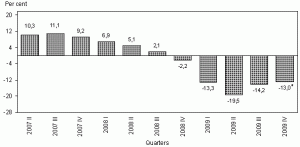VILNIUS — The Lithuanian economy went down -15 percent year-on-year according an initial estimate by the country’s statistics department.
Gross domestic product in the fourth quarter of 2009 was -13 percent year-on-year also, up from a -14.3 percent in the third quarter. In the fourth quarter the economy was buoyed by an increase in exports as the large Western European economies such as France and Germany recovered. Meanwhile the Christmas season boosted retail sales from their precipitious decline earlier in the year.
“We now see signs of stabilization in the Lithuanian economy. Developments in monthly data indicate this as well — the freefall in industrial production has stopped and export performance has improved significantly,” Danske Bank Senior Baltic Economist Violeta Klyvienė said in a statement to the press.
The numbers have economists optimistic about the economy’s recovery after being one of the hardest-hit in the world by the credit crisis. The Lithuanian Central Bank expects growth to be either at zero or one percent in 2010.
Gitanas Nausėda, an adviser to the president of SEB Bank’s Lithuanian subsidiary said the exports of wood products, furniture, plastic and rubber are improving.
“Already three export sectors – wood and paper, furniture, plastics and rubber products – grew, compared to the same period last year, while the increase in exports of chemical products can be expected in the near future,” Nausėda told Lietuvos Rytas.
Overall industrial production remains down from the year before, although the decline is ebbing. Meanwhile unemployment, currently at 13.8 percent continues to rise. The government, led by Prime Minister Andrius Kubilius, announced earlier in the month that job growth would be a top priority but have little concrete details on plans.
“A sustainable recovery in domestic demand is still far off, as labor market indicators are expected to deteriorate further and income growth is expected to remain weak as well,” Klyvienė said.
The country’s lack of preparedness for the Ignalina Nuclear Power Plant shutdown on New Year’s Eve could stifle growth, as higher energy prices could force companies to cut staff.
“The uncertainty surrounding the more optimistic growth scenario remains relatively high mostly due to the energy issue,” Klyvienė said. “It is too early to talk about a sustained recovery in growth,” she said adding that the bank expects GDP to decline this year by up to 3 percent year on year.
Due to the rise in energy prices Klyvienė expects growth to turn negative again in the first quarter of this year and does not expect a sustained economic recovery until the second half of the year.
Nausėda gave a similar assessment, saying he expects growth to resume in the second half of the year as energy prices hurt domestic demand.
“Employers may try to compensate for the increase in energy costs in lower labor costs, that is, reducing average wages or releasing staff,” Nausėda said.
— Baltic Reports editor Nathan Greenhalgh contributed to this article.













